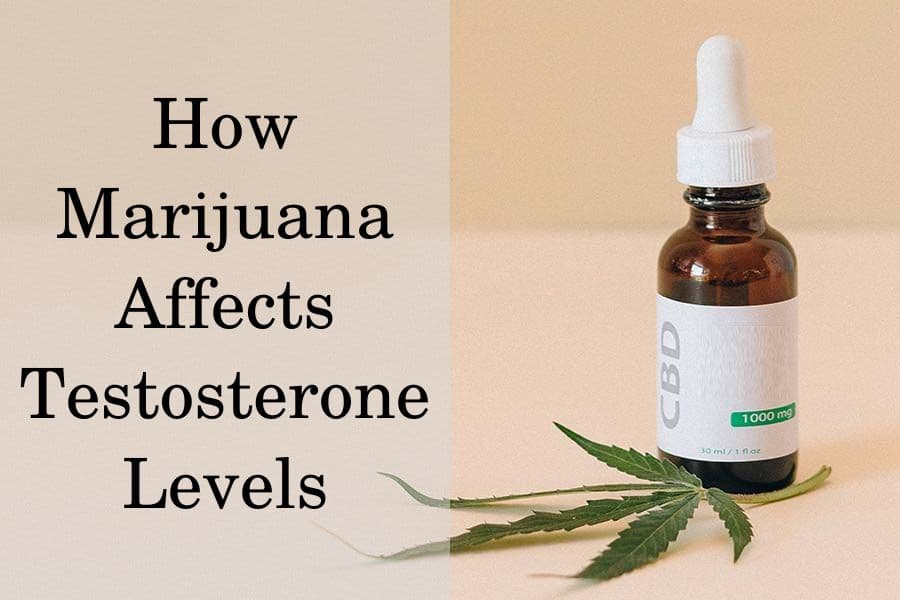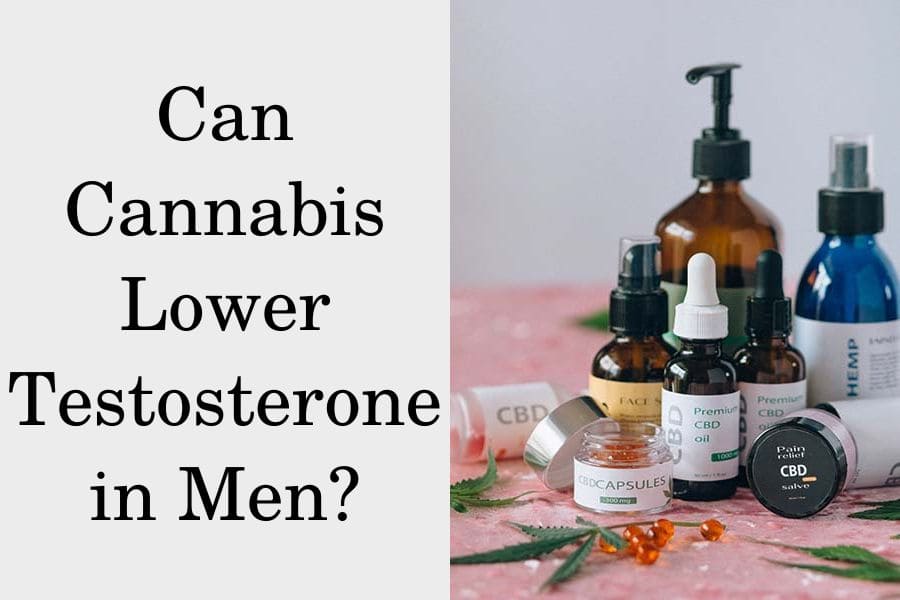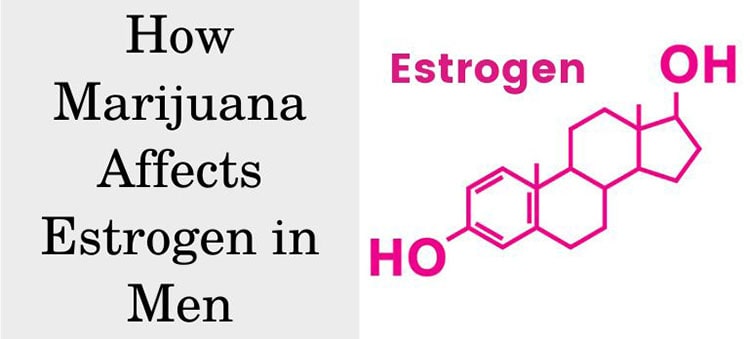Marijuana is the most popular recreational drug in the world. Its wide use both medicinally and recreationally, as well as the legalization of cannabis in the US has led to increased interest and scientists and researchers.
The amount of scientific evidence keeps increasing regarding the potential benefits and side effects of cannabis and its many active substances called cannabinoids. Inside your body, cannabinoids affect specific endocannabinoid receptors which can be found in numerous organs and systems, including the reproductive system.
Thus, one of the topics researched by scientists is the interaction of marijuana and its compounds with the male reproductive system, including the pituitary gland, sperm cells, and testes.
Unfortunately, current evidence is insufficient to confirm the exact effect of marijuana and cannabinoids on male hormonal levels
Most of the research so far has focused on fertility and overall cannabinoids appear to have a negative effect. Therefore, smoking weed may be a potential risk factor for hormonal imbalance and low sperm count.
Does marijuana lower testosterone in males?
According to the research, marijuana has a complex effect on the male reproductive system and affects testosterone (T) production in several ways. That’s because there are endocannabinoid receptors in the pituitary gland, the testes, and even the sperm cells.
Unfortunately, there is significant heterogeneity in the current literature, and the different studies show variable results regarding the effects of cannabis on testosterone.
Most laboratory studies including animal and in vitro research have shown that cannabis has negative effects on testicular function and male fertility. The most likely mechanism suggested by the studies is that cannabinoids suppress the function of the pituitary gland, which leads to a decreased stimulus towards the testes.
The pituitary gland produces LH (luteinizing hormone) and FSH (follicle-stimulating hormone). They are called gonadotropic hormones and their function is to stimulate testosterone and semen production in the testicles.
Human research is inconclusive and some studies show positive while others suggest negative effects of marijuana on T levels
For example, one of the earliest analyses on the topic reported that smoking weed can lower testosterone significantly. The effect occurred immediately and lasted for about 24 hours. Thus, the researchers suggested that the recency of marijuana use is the factor that affects T levels the most.
The effect was also similar after intravenous infusion with THC alone. THC is one of the cannabinoids in marijuana which possesses psychoactive and other pharmacological effects.
Thus, the effect of cannabis on T levels will most likely depend on the levels of cannabinoids such as THC, rather than the form of the derivative, whether flowers, edibles, oils, concentrates, or topical cannabis products.
Apart from THC, another common cannabinoid called CBD also has been found to have a negative effect on the function of the testes and T synthesis.
Exact effects of smoking weed on T synthesis may also depend on the levels of both CBD & THC
Usually, Cannabis Sativa has high THC and low CBD content, while Cannabis Indica has both high THC and CBD. Thus, Cannabis Indica may have a stronger negative effect on T levels.
A more recent review of 8 clinical trials reported that smoking marijuana does not have a significant effect on testosterone levels. Five of those trials also investigated the effects of marijuana on LH & FSH and the researchers reported that cannabis leads to small but significant decreases in FSH levels, while LH is decreased insignificantly.
Another trial even found a positive effect and 7% higher T levels in marijuana smokers than non-smokers. The increase was comparable to tobacco smokers but both tobacco and cannabis smokers had decreased semen quality.
Effects of CBD on testosterone
CBD is often regarded as a cannabinoid with many medicinal effects. Unlike THC, it does not possess psychoactive properties, but preliminary studies have shown some promise in the management of epilepsy, anxiety, depression, pain, inflammation, addictive behavior, and more.
Unfortunately, human research regarding the effects of CBD on testosterone in men is scarce. So far, scientists have studied its action in vitro and in mice, and the results are mostly negative.
The largest review so far was conducted in 2020 and covered 32 studies including laboratory experiments and clinical trials. According to the research, CBD lowers levels of pituitary gonadotropins as well as testosterone and may even lead to reduced testicular size.
Thus, the scientists concluded that CBD disrupts testosterone synthesis secondarily, by lowering the levels of gonadotropic hormones (LH & FSH) and decreasing the stimulus towards the testes.
Effects of THC on testosterone
THC is the main psychoactive component of marijuana. Its effects on T levels are rather mixed, as some studies suggest THC use lowers the male reproductive hormones, while others report insignificant effects or even an increase.
For example, one large retrospective study which included more than 5000 participants reported that men who use THC regularly had higher T levels than those who don’t.
Regarding the frequency of THC use, those who used it regularly two-three times per month had higher T levels than heavy users, but all users still had higher testosterone on average than non-users.
Nevertheless, the results remain mixed, as many studies also suggest mostly negative effects of THC on testosterone synthesis. The researchers also note that regular THC use can lead to the development of tolerance, which potentially decreases some of the effects of the cannabinoid including those on T levels.
In comparison, CBD does not lead to the development of tolerance. Thus, CBD may have stronger and persisting testosterone-reducing effects when compared to THC.
Does weed increase estrogen levels in men?
Estrogens are known as the female reproductive hormones, but they can also be found in small amounts in the male body, produced mainly by the aromatization of testosterone.
Currently, there are only animal and in vitro studies regarding the effects of cannabis on estrogen levels in men. Animal studies suggest that marijuana can suppress testosterone levels in rats, but does not lead to increased estrogen levels.
In vitro studies have even reported antiestrogenic and aromatase-inhibiting effects of marijuana smoke. Yet, when various components such as CBD and THC were tested in isolation, there was no anti-estrogenic activity
Yet, another in vitro experiment suggested that even in isolation, THC can disrupt the estrogen receptors in the body, thus resulting in antiestrogenic activity.
All these results contradict several epidemiological studies which suggest that marijuana may have estrogenic effects and can potentially lead to adverse reactions in men such as gynecomastia.
For example, one study amongst more than 4000 men with gynecomastia reported that frequent marijuana use was one of the risk factors for the development of enlarged breast tissue.
Another trial conducted in Nigeria which included 2290 long-term marijuana users reported an increased incidence of gynecomastia amongst the participants, alongside reduced testicular size, testosterone, LH, and FSH levels. Yet, none of the trials measured the estrogen levels of the affected men.
Apart from cannabinoids like CBD and THC, marijuana may contain other compounds that have estrogenic effects instead. For example, some scientists suggest that the phenolic compounds found in the plant and in cannabis smoke may mediate these effects.
Can you use marijuana while on TRT?
Currently, there is not enough evidence to suggest that marijuana use may interact with testosterone replacement therapy (TRT). TRT is the therapy of choice for men with low T levels and symptoms.
Even though some studies on cannabis have reported negative effects on natural testosterone synthesis, none has reported reduced responsiveness to the male sex hormone or other androgens.
Thus, smoking weed should not lead to any interactions regarding the effectiveness of TRT. This also includes the use of CBD, THC, combined products, and other cannabis derivatives.
On the other hand, marijuana may worsen one of the most common side effects of TRT – infertility. Several reviews of the scientific literature have concluded that smoking marijuana worsens semen parameters such as sperm count and sperm motility.
TRT also leads to infertility by suppressing the natural testosterone synthesis in the testes, which is essential for sperm production. Therefore, smoking weed during TRT may speed up the occurrence of infertility and may also slow down the recovery of spermatogenesis after stopping testosterone injections.
Get a free consultation with our medical expert for any questions about hormone replacement therapy



